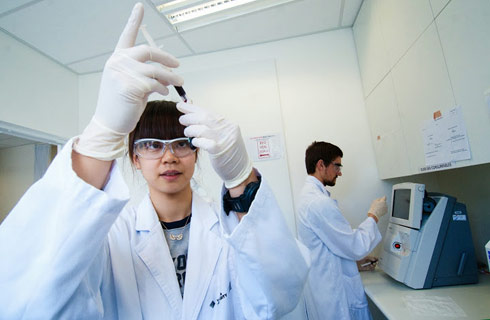MChem(荣誉)化学用于药物发现和开发
Chemistry for Drug Discovery and Development - MChem (Hons)

学历文凭
Bachelor Degree

专业院系
School of Natural Sciences

开学时间

课程时长

课程学费

国际学生入学条件
IDP—雅思考试联合主办方

雅思考试总分
- 雅思总分:
- 托福网考总分:
- 托福笔试总分:
- 其他语言考试:
CRICOS代码: F152
申请截止日期: 请与IDP联系 以获取详细信息。
课程简介
The MChem Chemistry for Drug Discovery and Development is designed to develop skills in the design and development of active molecules, all the way through to the final pharmaceutical products available to patients. Students can gain knowledge of synthetic chemistry and develop experience in drug formulation and manufacture within the regulatory context of the pharmaceutical industry. This will involve substantial practical experience of advanced laboratory techniques.On this programme, students have the opportunity to develop a comprehensive knowledge of chemistry alongside subject-specific and generic skills to develop a strong understanding of how chemistry is applied to problems with direct impact on society. Our programmes are designed to produce highly employable graduates with a broad background in academic chemistry and significant experience of the application of chemistry in contexts relevant to society and industry.The programme takes an integrated approach to organic, inorganic, and physical chemistry, exploring how they work together.Students can focus initially on organic, inorganic, and physical chemistry through an integrated approach that emphasises connectivity. Laboratory workshops and extensive use of specialist equipment aims to enable students to develop hands-on skills. Later in the course, students have the opportunity to apply their experience to a range of real-world applications, including industry-informed interdisciplinary projects. A significant research project provides students with the chance to develop a specialism of their choice. Throughout the course, there is an emphasis on developing the professional skills required in your future career.The course includes lectures, seminars, laboratory-based practical classes, and lectures from visiting scientists. Extensive small-group teaching and innovative team-based learning create a supportive learning environment that helps you train through practice- and problem-based approaches.All students in the fourth year of the MChem programme currently have the opportunity to undertake a full-year industrial placement. You can choose your placement with one of the University's industry or overseas partners, or in one of our research groups. Placements are conducted alongside advanced academic study, focusing on research frontiers in chemistry.Students are supported in finding their placement and when undertaking it. Salaried placements are competitive and students will be expected to complete an application process for such positions. In addition to paying their tuition fees, students will need to cover their own travel, accommodation, and general living costs throughout their placement.
相关申请
 预科
预科 奖学金
奖学金 实习机会
实习机会 在校学习
在校学习 跨境学习
跨境学习 校园授课-线上开始
校园授课-线上开始 在线/远程学习
在线/远程学习
开学时间&学费
学费信息仅供参考,请与IDP联系以获取详细信息
| 开学时间 | 时长 | 学费 | 地点 |
|---|
学校排名

世界排名601
数据源:
泰晤士高等教育世界大学排名
关于林肯大学

自女王陛下首次揭幕以来,已有超过10万名来自135个国家/地区的多元文化背景的学生选择在林肯大学学习。这些学生是林肯大学一切工作的核心,林肯大学真正关注的是卓越,这一点在许多英国和国际大学排行榜和调查中得到了认可。在泰晤士报高等教育(THE)2021年青年大学排名中,林肯大学被列入世界前150名。林肯位于英格兰东中部地区,对学生来说是一个迷人的地方,其历史可以追溯到公元前300年。这里有欧洲最好的大教堂之一,也有各种商店和酒吧以及屡获殊荣的Brayford Pool校区。林肯有很多东西可以探索,它是林肯城堡的所在地,是很多重要历史人物的出生地,包括艾萨克-牛顿爵士和玛格丽特-撒切尔。林肯大学自2001年以来投资超过3亿英镑,创造了一个以学生为中心的现代化环境,提供了令人难忘的学生体验。该校91%的新毕业生在完成课程后15个月内就业或继续深造,超过70%的人从事高技能工作(2017/18年毕业生成果研究)。由于该机构与业界的紧密联系,很多林肯大学的毕业生进入跨国公司工作,包括劳斯莱斯、BBC、汇丰银行和西门子。林肯大学因其为解决今日社会面临的最严重问题做出的研究发自内心感到自豪。林肯大学的多半研究被最新卓越研究框架评为世界领先或具有国际卓越性。
本校相关课程

理学硕士运动科学
学历文凭
Masters Degree (Taught)
开学日期
课程费用总额


社会工作硕士
学历文凭
Masters Degree (Taught)
开学日期
课程费用总额


硕士/博士学位社会科学
学历文凭
Ph.D.
开学日期
课程费用总额


硕士/博士社会政策
学历文凭
Ph.D.
开学日期
课程费用总额


DClinPsy Psychology
学历文凭
Ph.D.
开学日期
课程费用总额


MPhil / PhD政治
学历文凭
Ph.D.
开学日期
课程费用总额

其他相关课程

PhD New Routes Towards Asymmetric Carbon Dioxide Incorporation for Organic Synthesis
 拉夫堡大学
拉夫堡大学泰晤士高等教育世界大学排名:316
学历文凭
Ph.D.
开学日期
课程费用总额


拥有一年工业或研究学士学位(荣誉)药物化学。
 雷丁大学
雷丁大学泰晤士高等教育世界大学排名:242
学历文凭
Bachelor Degree with Honours
开学日期
课程费用总额


化学科学硕士
 乐卓博大学
乐卓博大学泰晤士高等教育世界大学排名:267
学历文凭
Masters Degree (Coursework)
开学日期
课程费用总额


化学(具有工业培训年)MChem荣誉
 纽卡斯尔大学
纽卡斯尔大学泰晤士高等教育世界大学排名:144
学历文凭
Undergraduate Masters
开学日期
课程费用总额


博士化学(中国)
 利物浦大学
利物浦大学泰晤士高等教育世界大学排名:143
学历文凭
Ph.D.
开学日期
课程费用总额


PGCE and ProfGCE in Secondary Education Chemistry
 赫特福德大学
赫特福德大学泰晤士高等教育世界大学排名:765
学历文凭
Graduate Certificate
开学日期
课程费用总额










